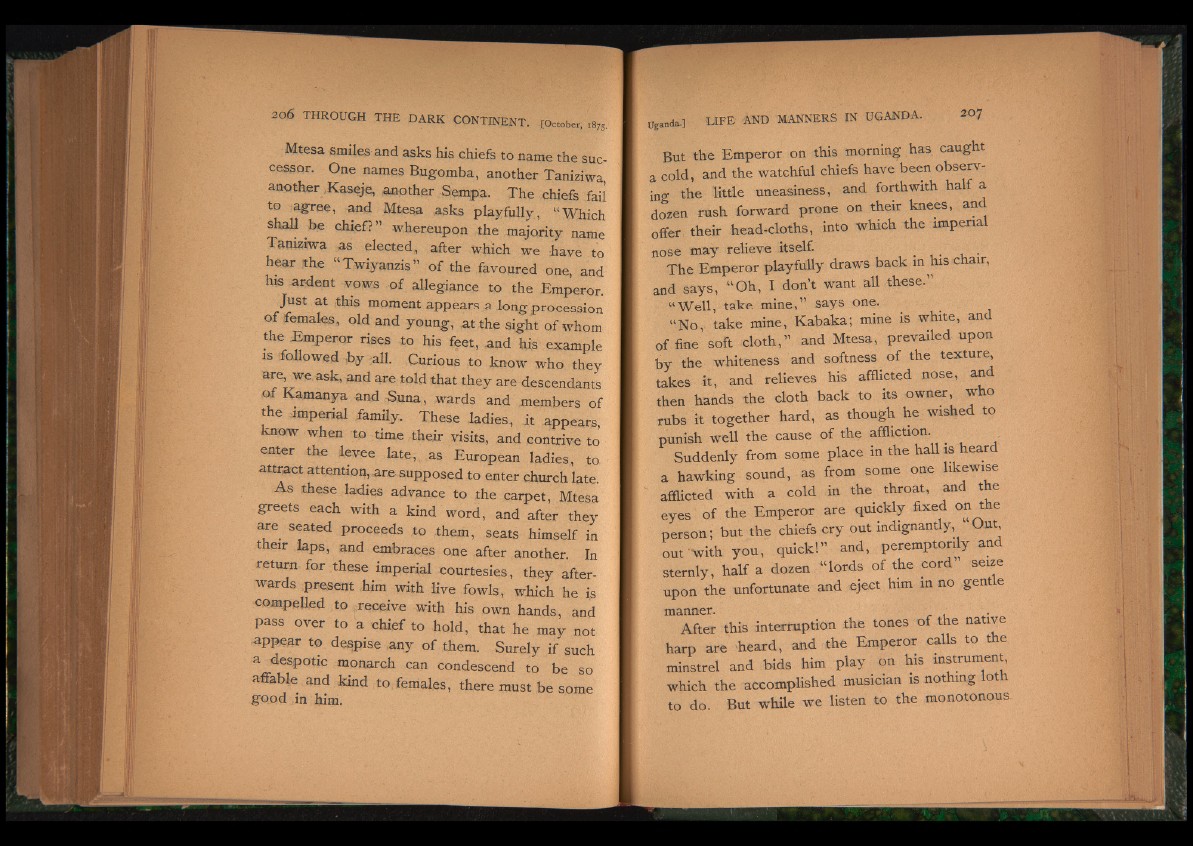
Mtesa smiles and asks his chiefs to name the successor.
One names Bugomba, another Taniziwa
another Kaseje, another Sempa. The chiefs fail
to agree, and Mtesa asks playfully, “ Which
shall be chief? ” whereupon the majority name
Taniziwa as elected, after which we have to
hear (the “ Twiyanzis” o f the favoured one, and
his ardent vows o f allegiance to the Emperor.
Just a t this moment appears a lon g procession
o f females, old and young, a t the sight o f whom
the .Emperor rises to his feet, and his example
is followed b y all. Curious to know who they
are, we ask, and are told that they are descendants
o f Kamanya and Suna, wards and members of
the imperial family. These ladies, j t appears,
know when to time their visits, and contrive to
enter the levee late, as European ladies, to
attract attention, a r e supposed to enter church late.
A s these ladies advance to the carpet, Mtesa
greets each with a kind word, and after they
are seated proceeds to them, seats himself in
their laps, and embraces one after another. In
return for these imperial courtesies, they afterwards
present him with live fowls, which he is
compelled to receive with his own hands, and
pass over to a chief to hold, that he may not
appear to despise a n y o f them. Su rely if such
a despotic monarch can condescend to be so
affable and kind to females, there must be some
g o od in him.
But the Emperor on this morning has caught
a cold, and the watchful chiefs have been observing
the little uneasiness, and forthwith half a
dozen rash forward prone on their knees, and
offer their head-cloths, into which the imperial
nose may relieve itself.
The Emperor playfully draws back in his chair,
and says, “ Oh, I don’t want all these."
“W e ll, take mine,” says one.
“ No, take mine, Kabaka; mine is white, and
of fine soft c lo th ,” and Mtesa, prevailed upon
b y the whiteness and softness o f the texture,
takes it, and relieves his afflicted nose, and
then hands the cloth back to its owner * who
rubs it together hard, as though he wished to
punish well the cause o f the affliction.
Suddenly from some place in the hall is hear
a hawking sound, as from some one likewise
afflicted with a cold in the throat, and the
eyes o f the Emperor are quickly fixed on the
person; but the chiefs cry out indignantly, “ Out,
out with y o u , quick!” and, p e r em p to r y and
sternly, half a dozen “ lords o f the cord seize
upon the unfortunate and eject him in no gent e
manner.
After this interruption the tones o f the na ive
harp are h eard, and the Emperor calls to the
minstrel and bids him p lay on his instrument,
which the accomplished musician is nothing ot
to do. But while we listen to the monotonous